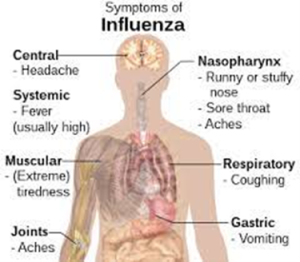Please click the frequently asked questions below for further information and IPC precautions required:
What is Flu?
Influenza or ‘flu’ is a respiratory illness associated with infection by influenza virus.
Influenza occurs most often in winter and usually peaks between December and March in the northern hemisphere. There are two main types that cause infection: influenza A and influenza B. Influenza A usually causes a more severe illness. The influenza virus is unstable and new strains and variants are constantly emerging, which is one of the reasons why the flu vaccine should be given each year.
For most people, influenza infection is just a nasty experience, but for some it can lead to more serious illnesses.
Those defined as ‘at risk’ include:
- pregnant women in all stages/ any trimester of pregnancy
- anyone aged over 65 years, even if they feel fit and healthy at the moment
- children and adults who have any of the following medical conditions:
- a chronic chest condition such as asthma
- a chronic heart condition
- chronic liver disease
- chronic kidney disease
- diabetes
- lowered immunity due to disease or treatment such as steroids or cancer therapy (people living in the same house as someone with lowered immunity may also need to be vaccinated)
- a chronic neurological condition such as stroke, multiple sclerosis or a condition that affects your nervous system, such as cerebral palsy, or hereditary and degenerative diseases of the central nervous system or muscles
- any other serious medical condition – check with your doctor if you are unsure
- children who have previously been admitted to hospital with a chest infection
- children attending schools for children with severe learning difficulties
- anyone living in a residential or nursing home
- main carers for older or disabled people

Symptoms
Flu is not just a common cold. Flu is an acute viral infection of the respiratory tract, It usually comes on suddenly, and people with flu may have some or all of the following symptoms:
- Fever
- Aches (muscle, body, and headaches)
- Chills
- Tiredness (fatigue)
- Sudden onset
- Cough, runny or stuffy nose, and/or sore throat
- Vomiting and diarrhea (more common in children than adults)

How is it spread?
People with flu can spread it to others. Flu viruses spread mainly by droplets made when people with flu cough, sneeze, or talk. These droplets can land in the mouths or noses of people who are nearby or possibly be inhaled into the lungs. Less often, a person might get flu by touching a surface or object that has flu virus on it and then touching their own mouth, nose, or possibly their eyes.
IPC Precautions:
- Droplet precautions (FRSM) should be used for routine care.
- Airborne precautions (FFP3 mask) should be used if an aerosol generating procedure for example intubation /extubation etc. is being undertaken.
- Hand Hygiene should be completed as per the 5 moments in line with usual practice.
- Eye protection should be risk assessed for any concern regarding a splash risk.
- A Fluid Resistant Surgical Mask should be worn.
- Gloves and Aprons should be worn.
- The patient should be transported via ambulance with no other patients present.
- Laundry should be treated as contaminated, placed into an alginate bag and placed into a red laundry bag.
Why is this important?
If NIAS staff are aware that the patient has a suspected or confirmed case this should be communicated to the Control Room (Emergency or Non-emergency as appropriate) and the staff in the receiving unit when transferring the patient to ensure effective patient care and management.
What cleaning is required?
All equipment and the ambulance should have an in-between patient clean, paying particular attention to touch points.
Do staff need Prophylaxis or follow up?
If you are exposed to a confirmed case of Flu and you fall into any of the at risk categories below you should let your Station Officer / Line Manager and Occupational Health know as they will arrange for you to have Post Exposure Prophylaxis (PEP), this however can only be given up to 48hours following exposure.
Contact the IPC team for further advice during working hours.
Vaccination
All staff are encouraged to get the flu vaccine to protect themselves, their patients and their families. The trust will provide a vaccination programme each year the details of will be shared on the internet and other routes.
